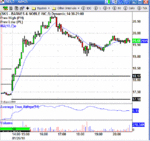In his first posting to this thread, he was talking about "The Financial Industry", and gave examples, e.g. IPOs, then Mutual Funds, and then went on to talk about brokers, training courses, etc. I assumed his argument was the gamut of trading that tends to get talked about on T2W, a lot of which has little directly to do with stocks.
The thread may have started out with the above, but nearly all of the posts apart from the above refer to stocks, which you have chosen to ignore in your response.
The main point of the discussion I have been involved in is response to DTs assertion that "pure" TA does not work without "discretion" or "FA" input.... and in looking to define what he means by these two terms...lets not change to subject of the discussion.
Some examples :
Post 23
"A company coming to the end of it's lock-up period is part of fundamental analysis but has nothing to do with price-earnings, price-book, debt to equity etc. It is simply a moment in the life-cycle of the company where things change."
As far as 'everything else' is concerned we have
- market participant information
- scheduled announcement information
- insider activity information
- news
- company financial information
- company life-cycle information
- product release/approval/patent expiration
- industry information
- economic information (employment, inflation, interest rates, inventories, retail sales etc)
- index re-balancing"
Post 171 :
"TA purists say that everything is built into price.
They will then say that of course you stand aside during earnings & economic announcements.
But apart from that - everthing is built into price.
So - even though technicians will admit that non-technical information is needed in the case of earnings/announcements, they refuse to believe that other non-technical information could be as much or even more useful."
Post 148 :
"Mr Charts - You don't know the whole picture. How do you think he's got the right stocks on his screens at the right moment ? "
When a stock is first put on the market, there's a 4 month quiet period and a 6 month lock-up period during which insiders can't sell the shares they gave themselves. So - 4 months where they can't pump the price up followed by 2 months where they can at which time they can start to offload their holdings. For this scenario, you don't have to know everything about the company. Like a game of poker, the players may tip their hands as to what they are going to do. "
Post 141:
"Imagine you could put youself in the shoes of the people making decisions in a company & understand how their own self interests would sway things."
Post 121 :
"Right GladiatorX - did you keep an eye on XLNX & KMP yesterday as I said ?
Do you see how the earnings went the opposite way to the markets expectation ? I'm not talking about the earnings vs expected earnings but earnings vs price move prior to the earnings."
Post 125:
Do you think that a collar around stocks you don't hold would be a good strategy too or are you mostly doing that for 'insurance' purposes ?then went on to talk about brokers, training courses, etc. I assumed his argument was the gamut of trading that tends to get talked about on T2W, a lot of which has little directly to do with stocks.

